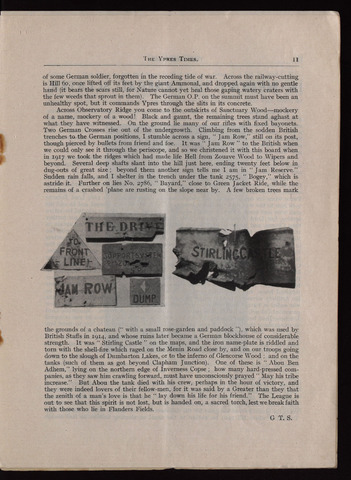The Ypres Times.
II
of some German soldier, forgotten in the receding tide of war. Across the railway-cutting
is Hill 60, once lifted off its feet by the giant Ammonal, and dropped again with no gentle
hand (it bears the scars still, for Nature cannot yet heal those gaping watery craters with
the few weeds that sprout in them). The German O.P. on the summit must have been an
unhealthy spot, but it commands Ypres through the slits in its concrete.
Across Observatory Ridge you come to the outskirts of Sanctuary Woodmockery
of a name, mockery of a wood! Black and gaunt, the remaining trees stand aghast at
what they have witnessed. On the ground lie many of our rifles with fixed bayonets.
Two German Crosses rise out of the undergrowth. Climbing from the sodden British
trenches to the German positions, I stumble across a sign, Jam Row," still on its post,
though pierced by bullets from friend and foe. It was Jam Row to the British when
we could only see it through the periscope, and so we christened it with this board when
in 1917 we took the ridges which had made life Hell from Zouave Wood to Wipers and
beyond. Several deep shafts slant into the hill just here, ending twenty feet below in
dug-outs of great size; beyond them another sign tells me I am in Jam Reserve."
Sudden rain falls, and I shelter in the trench under the tank 2575, Bogey," which is
astride it. Further on lies No. 2786, Bayard," close to Green Jacket Ride, while the
remains of a crashed 'plane are rusting on the slope near by. A few broken trees mark
the grounds of a chateau with a small rose-garden and paddock which was used by
British Staffs in 1914, and whose ruins later became a German blockhouse of considerable
strength. It was Stirling Castle on the maps, and the iron name-plate is riddled and
torn with the shell-fire which raged on the Menin Road close by, and on our troops going
down to the slough of Dumbarton Lakes, or to the inferno of Glencorse Wood and on the
tanks (such of them as got beyond Clapham Junction). One of these is Abou Ben
Adhem," lying on the northern edge of Inverness Copsehow many hard-pressed com
panies, as they saw him crawling forward, must have unconsciously prayed May his tribe
increase." But Abou the tank died with his crew, perhaps in the hour of victory, and
they were indeed lovers of their fellow-men, for it was said by a Greater than they that
the zenith of a man's love is that he lay down his life for his friend." The League is
out to see that this spirit is not lost, but is handed on, a sacred torch, lest we break faith
with those who lie in Flanders Fields.
G T. S.

